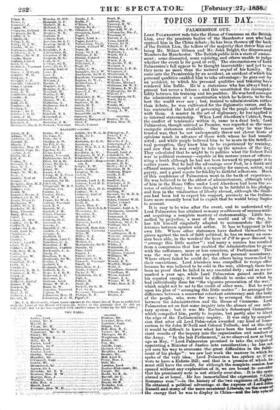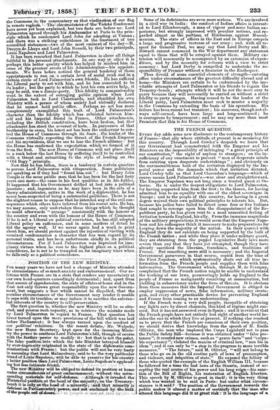TOPICS OF THE DAY:=1.,%, LORD PALMERSTON rode into the House
of ComMtfilO on ttjlh; Lien, over the prostrate bodies of t-he Manchester' Men T:.
opposed hint in the china debate ; he has beenthrehrii ifitieko
of the EHtishL16n, the -teller's of the majority-that th thr.tittf being Mr. Milner Gibson and Mr.-John Brilit,-theditipee.4easea Members.for Manchester: The Aritis'Irpiiblie is j a state' of' amaze- meat ; some diamayed, some rejiiienig,-and others 'Unable th judge whether the eveiit is for'goad,--bi" The'diretiniittinceiltotliold PahnetitOo's fall appear to be thenght inscrutable; us they seem no more than he liatural sequel of his Latoty. Ho came into the Premiership frYlin accident, an, ateiilent of,whieh his. personal qualities enabledliliii to take advantage; the goes' out by. an accident, to -Which his tpersorial qualities '-tindltkainifig have'.
rendered him liable. Held a. atatearnan. WI* Ilan liflikaye 'had a present bat never a future ; and this iioitatiftited -the iliCompati-
bility between his training and his poifition.Hawaehreitainougst the administrators of a-constitution whiehterbelieWs flitibe the beet the world ever saw ; but; trainerltolitlinirtistriffionetther than debate, he was 'cultivated fel" the diplthitatic career, Anil he.' has cOntracted the habit of governing for' the' people riitheetlien with them. A master in the urt of 'cliplomatiy; he liattrinViettit to' iitternal-stateemanship.- 'When Lord 'AbettleefiV Cabinet, Troia the conflict of tendencies 'within it; 'eiune ta dt4id olOblt4o laird Palinereton, though untriedas Premier, was
energetic statesman statesman aiiillable. One reason
trested was,- that he. not unfreqtteatly tiireiVIOnt ,e1~11Tizite of in advance ' of those with, whom acted ; and-While people believed hith to be •acateitallel. %Mice- tual perception, they knelt 'Min to be experietieetV and saw that he was readfto' take up the mission They calculated that he inight..be to polities wlief.'Sie.kobertPeel was to political ecoilonvecapable in-his maturely#a*of effectu- ating a truth although he had not been forwarateTtbpagate earlier rears. 13nt lie had the advantage over •Peelon a frank:end offhand' manner, coupled 'witha sympathy for gayety, and good repute for fidelity to faithful adherents. 'Much of this confidence of Palmerston went in the teeth' of 'ekpetiettee. • He was believed to be the ablest of administrator, - althotigh, trial of him in the Home Office 'under Lord Aberdeen had beenthe
verse of satisfactory ; he was thought to be faithful to his pledge's and firm in the vindication of liberty abroad, although' the Sicili- ans had 'been led to expect his support,- precisely as the Italians have more recently been led to expect that he would bring Naples to account. ' ' • - • .
It is easy to be Wise after the event, and to understand why Lord Palmerston has attained so many'semblonces of success with- out acquiring a 'complete Mastery of statesmanship:- Little tra- melled -by-prejudice; a Men of the world and •of-j the Arty, he has felt 'himself singularly adapted to abeeniniedate- the 'dif- fetenCes between opinion and aetien. It has 'so-happetiOd in his own life. Where other statesmen have dashed themselves to pieCes'against the rock of faith political, he has on many an Ocea- • mon been able, in the words Of the hero of I'll be vont.: Second, to "arrange this little matter" ; and Many a success -has resulted from a compromise that has 'enabled theAdministration to g0' on with the sufferauee, more or less•cOniCiaue, of 'Parlianiont.' This was the way in which he acquired his personal'aseenditney.
Where others foiled he could do; the others being trammelled by their convictions. Lbrd Aberdeen was etinipelled to resign office because he was believed to be cold in the war,, :although there has
been no proof that he failed in anyessential duty ; and;as ke- marked a year ago, while' Lord Palmerston gained: credit for his' reputed. energy; . it would be difficult to .make, out what ho had individually done for "the vigorous prosecutien of the war," which might not be set to the' credit of .other men. • But hefaveut ' upon his plan of "arranging this little matter": beArranged the difference between a somewhat reluctant -aristoeracTandAke 'body of the people, who were for war; he arranged the difference between the Adminietration.ank the •House of. Commons. • Lord Paltherston set on foot some.' inquiry into the abuses of our mili- tary system.; but it was Mr.' Roebuck's SebaaMpolAniimittee which compelled Iiin, partly to -inquire, but partly also[tdlunt the edge of. the Parliamentary inquiry. • It was only byieoinpul-' sion that after all Lord Palmerston, awarded ray kind of fhono- rarium to Sir John M'Neill and Colonel Tulloeh, and at this day it would be difficult to know what have-been the broad or suffi- went •results of the inquiry into. tlie .orgenization and conduct of the-Army. "In the last Parliament," as we observed now so long ago-as May, "Lord Palmerston promised to take the subject of appointing a Minister of Justice into consideration; he has not yet seen his way to avereome the great difficulties' in the fulfil- nient of his pledge': We saw last week the manner- in which -he spoke of the very -idea. Lord Palmerston has spoken as if we were to have a Reform Bill; and: that is a 'promise, Of: wbieh he must still have the credit, for although the complete.! session has opened withentany:explanationof it, we are bound: to consider that his promissory note -is not' strictly over-due. It is the tattle abread as at home He has immortalized the eitpression Romanus sum."-1---in the history of .the'twir engineers at Naples. • He obtained a political :advantage. at the.:expenee of Lord John Russell and.many of -the more.00nsistent'LiberalsOn the score of the energy that he was to display in Chhiet,-,..ittit the late vote-of the Commons is tha commentary on that vindientafopoof our flag in remote 1:ogler's. t.k. The/ einednistaides of the) Viehad Conference have never yet been explained,-but two facts are before us: Lord Palmerston agreed throfigli(hitanabassiaOrnt Paris to the prin- ciPIP:14i* ba .coneune4 Lord. John for adopting :at 'Vienna ; and thera wee a striking couicidonce in the. treatment Of two aencedited -stateguen—etwo of, the most eminent of the, day.—M. Drouynde Limp and Lord John Itussell, by their twreprinmpals,
Louis Napoleon and Lord Palmerston. .
It has been remarked that Lord Palmerston is above all things, faithful to his personal attachments. In one yee.aeor other it is Perhaps this better quality which hes helped- t ,mislead him in, so.nie ef th;e greatest errors of his Admira • ...-his .appoint-
ments. We have before noticed the gene* cloiacy of those
appeintictents to ran on a certain level ,of: so .rarfle pia. in a certain circle of Lord. Palmerston's own friends:- Hellas itiffered the Liberal party to act with Inn, and he has consented. to be ite ipmtear but the party-to which he lent. his own actiVe help,: it may be said, was a dinner-party., i,This fidelity to 4oppanioxiship went to the extent of ontragiog Jefiblic opinien when Lord Palmerston took in Lord Clanriegade, and ideataged his own Ministry with a person of whom se,Ciety ,had virtually declared that he cannot hold public office. Perhaps no act has more conspiencipely exemplified this trait of Lord Palmerston's character khe* ;the fidelity which has subsisted between him- self and 'bin :Imperial friend in France. Other attachments, including the British - constitution, have been broken, but Met attachment hag fitood the severest of tests. In pursuance of that brothership inarnis, his latest act has been the endeavour to con- trel the House of Commons through its fears ;lie leader of the Commons virtually repeating the threat of the Peach Emperor and his myrmidons, thatwe are to Rise the French- alliance : but the Plow has confirmed the .expectation which we formed of it from the 4rst. The :aelY, House:of Commons will not place Itself in a rank belovr. the last HOUR by suffering itself to be controlled with a threat and submitting to the style of leading on the "Old Bogy" principle, Now, that haime.fallen, there is a tendency in certain quarters to pursue laird Palmerston. -with vituperation. Some politicians are speaking as if they had " found:him out " : bit ileng John Temple is the same pahlie man that he lia.s been.for thelast forty years and more—the same in his -best qualities as in IfiS,foibles. It happened that his Goyerpreent drifted at last into a political juncture.; and, iogenioua as he may have been in the arts of showy- administmternative in the. work of a,. dipkmatist, he has never heen suspected ofbeing a substantial politician; There is not the slightest remain to suppose that he intended, anyof the evil con- sequences which others have inferred from his recent acts-He has, WO may assume, only undertaken those things which he thought he °mild afterwards arrange" consistently with. the honour of the country and even with the honour of the House of Cenunens. If he is not a Liberal en political -conviction, he has still adopted.. Liberal policy on sufferance, and. in some matters of detail, he did the agency well.. If we never., again had a word to print about him, we should protest against the injustice of visiting with unmixed condemnation a character that has won regard y its personal traits, and has been unfortunate chiefly in its political circumstances. For if Lord Palmerston was epraised for ima- ginary virtues when he rose to.the highest place as a political coincidence, he is not to be trampled on for imaginary vices when he falls only as n political coincidence.



























 Previous page
Previous page